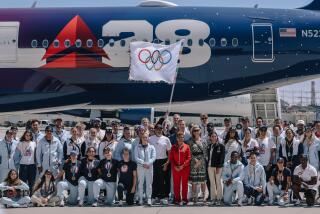Beijing moves to clear the air and the roads
- Share via
BEIJING — With the Games due to start in less than three weeks, Beijing on Sunday cranked up antipollution measures by yanking cars off the roads, expanding mass transit and staggering work hours in a bid to meet its pledge of a “green” Olympics.
Under rules to curb smog and traffic congestion that will last from July 20 to Sept. 20, owners of 3.3 million private cars can drive only on alternate days in China’s capital, based on whether the last digit of their license plates is even or odd. Those in violation face a $14 fine, a significant amount for most Chinese.
Buses, taxis and emergency and diplomatic vehicles are exempt.
Beijing has also staggered work hours, added 2,000 buses, reorganized bus routes and extended the hours of operation for mass transit and shopping malls.
Freight trucks that don’t meet minimal emission standards were banned July 1, creating a scramble among some people trying to move to a new house or arrange major deliveries. Summer camps have closed early given the difficulty of arranging children’s bus services. Shops report difficulties getting their stock replenished.
Over the weekend, the city also opened a $2.3-billion subway line linking the northern Zhongguancun area, the capital’s high-tech neighborhood, with its central business district.
Beijing, which adds 1,000 cars a week and is often wrapped in acrid smog, also announced a partial test of a second subway line that would feed into the main Olympic village area. Security has sharply increased in recent weeks, however, and that line will not be open to passengers without Olympic tickets or accreditation.
A light-rail line between the airport and the new Beijing transport hub of Dongzhimen is also opening.
According to the Washington-based Worldwatch Institute, 16 of the world’s 20 most-polluted cities are in China, making the environment a priority in the government’s bid to pull off the perfect Games.
Beijing has gone on a spending spree, relocating factories, seeding clouds, retiring old vehicles, planting millions of trees and halting building construction amid concerns that athletes and visitors could suffer breathing problems.
The prospect of competitors wearing masks during events has spurred authorities to set a goal of 256 “blue-sky” days this year, up from 100 in 1998.
World record holder and asthma sufferer Haile Gebrselassie of Ethiopia has opted to pull out of the marathon and concentrate instead on the 10,000-meter event. Other teams are training for as long as possible outside China.
The new traffic rules will be enforced by police and up to 10,000 cameras and high-tech scanning devices.
Traffic was noticeably lighter Sunday, which was overcast, but the real test was in progress today, when commuters returned to work. The added crush of subway users caused one of the city’s most important lines to seize up, according to Reuters. Authorities were allowing passengers off Line 2, which encircles central Beijing, but not on.
The government has also dedicated the left lane of many major thoroughfares to Olympic VIPs.
Zhang Rui, 24, a dentist whose vehicle has an odd-numbered license plate, plans to take taxis or subways for the next two months on even-numbered days, when his car is forbidden.
Even when he is allowed to drive, he said, he’s concerned that the dedicated Olympics lane will make things as crowded as ever in the remaining lanes.
“And the subway is going to be more crowded as well,” he said. “Plus, I’m worried about terrorism on the subway, so maybe I’ll stick to taxis.”
Wang Zuguo, 46, a parking attendant, said having fewer cars would eat into his $105 monthly salary, which is already stretched by rising prices for food and other essentials.
“The Olympics are all about face,” he said. “They don’t care about the little people.”
Beijing residents are speculating about how clear the skies will be during the Aug. 8-24 Games. But environmental groups say authorities’ actions are a short-term fix that doesn’t address the roots of China’s air-, soil- and water-pollution problems.
“If you stop the sources of pollution for a while, pollution goes away,” said Alex Wang, Beijing-based director of the China Environmental Law project at the Natural Resources Defense Council. “But the Olympics is only two weeks. Hopefully this will spur added investment for the long term.”
Three years ago, the European Space Agency released satellite data showing that Beijing and the surrounding area had some of the highest levels of nitrogen dioxide in the world. But similar restrictions have provided temporary relief.
Chinese authorities took an estimated 1.3 million cars off the capital’s roads during a China-Africa summit last August in something of a test run for the Olympics, and nitrogen dioxide levels dropped by 40%, agency data showed, although hazy conditions persisted.
More to Read
Sign up for The Wild
We’ll help you find the best places to hike, bike and run, as well as the perfect silent spots for meditation and yoga.
You may occasionally receive promotional content from the Los Angeles Times.






